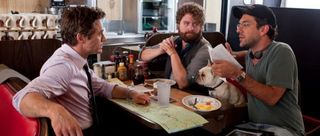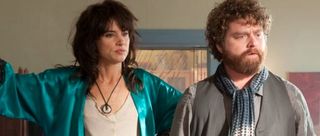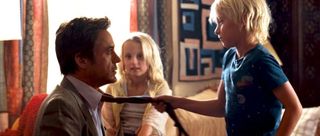Interview: Due Date Director Todd Phillips On Waffle House And Pushing Boundaries

It was a chilly Tuesday afternoon in Manhattan earlier this week, and Todd Phillips was visibly, utterly exhausted. The director had left the set of his next movie The Hangover 2 for a full-on publicity sprint for his film Due Date, alongside his Hangover 2 actor Zach Galifianakis and Robert Downey Jr., all of whom were hitting the talk show circuit and doing the usual round of interviews that surround any major release. That night he'd be getting on a plane to London for the UK Due Date premiere and then on from there to Thailand, where the Hangover 2 crew was setting up for the Bangkok sections of that film.
Phillips had actually canceled several of his interviews that afternoon before making the time for me, and despite some good-natured ribbing-- at several points he called me a Puritan, Amish, and a studio executive for pointing out some of Due Date's more uncomfortable jokes-- he was totally open to talking about the movie, the boundaries of comedy, why it's worth having an actor spit in a dog's face, and the surprisingly strict rules of shooting a movie at a Waffle House. He gave me a pretty good answer for the nagging question of the roles of women in his movie, and said that if he were ever to make a movie starring women, Juliette Lewis-- who appears in Due Date-- would be the star. He also told me that, while Puritans like me may cringe at a Charlie Sheen drug-use joke that closes the movie, Warner Bros. gave him no grief about keeping the joke in the movie.
In Due Date Downey Jr. and Galifianakis star as Peter and Ethan, a mismatched pair sent on a road trip across the country so Peter can make it home in time for the birth of his child. There's plenty of weird shit to get through, including multiple car crashes and a masturbating dog, but as Phillips told me, it's a movie about fatherhood above all. Check out our interview below, and catch Due Date in theaters everywhere this weekend.

Yesterday another critic and I were talking about what we saw as this movie's mean streak.
And did it bother you?
A little bit, yeah.
What are you, a Puritan? Seriously, what is people's problems. You should work at a Hollywood movie studio and be an executive. People say they want something different, and then you do it and they say, ah, he's too unlikable. How about, there are people in the world who are unlikable? Unless you just want to see movies about likable characters.
CINEMABLEND NEWSLETTER
Your Daily Blend of Entertainment News
No, and that is what's interesting about the movie. But they're also really mean to each other-- especially Peter is really mean to Ethan. And that's the trickiest part of it.
Yeah, but Ethan's just a flawed guy. He's not being mean to someone who's mentally retarded. He's being mean to somebody who completely could be his equal, but is so unaware of his effect on people and peoples' perception of him. I always say comedy plays well when it's a little bit real. I've really been annoyed by somebody, and I've had to travel over 2,000 miles with somebody, and I can understand there's a frustration there when somebody behaves the way Ethan does.
Peter and Ethan are such different characters that they almost feel like they're coming from separate worlds.
Well they are, because Ethan is coming from a place of pure love and acceptance by his family. And Robert feels as if he's been rejected by his own father.
Is that the key to their differences?
That would be the psychological key I guess, whether that comes across or not. I think Robert is inherently flawed in the way he was raised. The goal of the film is that maybe he becomes a better dad by having met this man-child and having to deal with him.
Is it hard to get two characters who are so different in the same comedic world?
I think that's my job as a director. Although the situations might be absurd, or the characters might be absurd, to keep the world that it's all taking place in to feel very real. Sometimes that's mundane and being at a Waffle House-- just to make it seem as grounded as possible.

I was very excited to see a Waffle House, because I grew up in the South and have been to many of them, but you never see them in movies.
Yeah, they're very strict about what they let you film there. I tried to film a scene from Road Trip there, where Horatio Sanz puts French toast down his pants. But they turned us down.
Did you have to send them the scene?
Yeah, they have to know what you're shooting. That scene in Road Trip was obviously a no-go.
Well they don't serve French toast there.
Well there you go. Maybe that was the reason. But this they had no issue with.
Even though they're sitting there with a coffee can full of ashes?
But they didn't do anything harmful. in Road Trip it would have been them saying, we do this to your food.
How much of the actual road trip were you guys doing while shooting Due Date?
We did a lot of it. For me, again, it's talking about that kind of reality that informs the movie ultimately. We were in Atlanta, Alabama, Texas, New Mexico, the Grand Canyon-- we kind of just were a traveling circus.
There are two car crashes with totally different tones-- in one they flip the car and he gets stitches in the arm, and in the other it's the trailer getting flipped around and jack-knifed on the highway, and everything's fine. There are completely different stakes for them, and they're in the same movie. How did you even have the confidence to say you could get away with it?
I don't know why we had the confidence, but it makes the movie fun, and the reason to do the movie was playing with the tones. Going from a heartbreaking scene maybe, where they're in the bathroom and Ethan's trying to show him he can act, to a masturbating dog--to jump those tones is something I really hadn't done as a director before, and that made it exciting and challenging to make this movie, and I think even exciting to Robert and Zach to be part of it.

Given how much response The Hangover got for pressing buttons in that way, did you feel pressure to up the ante more?
It wasn't upping the ante pushing boundaries, but it was upping the ante doing something more layered.
Yeah, because it isn't weirder than The Hangover, and I think people expect that.
No, it's not weirder. It's wronger. I understand people asking about The Hangover and this. But they're two totally different vibes to them.
There was so much talk about the women characters in The Hangover, and I wondered if you compensated in this by focusing even tighter on the two lead males.
Well, it's a movie about a male relationship, and The Hangover is a movie about three good male friends and Zach. Every movie doesn't have to be all things, and that's just the way that I look at it. This is not a Kate Heigl romantic comedy about Downey's relationship with his wife, this is a movie about two flawed characters coming together and butting heads and hopefully having to be better off meeting each other. That's just what the movie is. Not every movie has to serve as every audience member's need for completion. It wasn't even a conscious thing, for me it's just what serves the story. How does Heather Graham's character serve the story in The Hangover? Whatever Juliette Lewis does or goes through in this, or Michelle Monaghan, it serves the story, and the story is really about fatherhood.
Would it be another challenge for you, maybe, adding a woman to the central mix in another film?
I'd love to do a movie with females in it, and not necessarily the female version of The Hangover, but I'd love to. If I did it it'd star Juliette Lewis, because she's the funniest woman in the world. She's my favorite actress on the planet. If we did a character-based comedy about women, I don't see it out of my range. For me, it's just what story I'm attracted to, or who I'm attracted to working with at the moment. I wanted to work with Zach quickly again after The Hangover, and I wanted to always work with Downey, he's the best.

Was the scene where Downey punches the kid hard to get away with?
Again you should work for a movie studio. You sound exactly like an executive at Warner Bros.
I like the formula of movies, but also like when it's broken and done well, and I recognize that it's hard to do.
Yeah it's hard to do, but it's also why Robert Downey is Robert Downey, and he can get away with that. He spit on a dog's face and 5 minutes later people are rooting for him.
I actually didn't have a problem with the spitting on the dog. I think in the trailers it's out of context and people get kind of squirrelly about it.
Yeah, once you meet the dog you realize he's a total asshole.
Do you get any panicked phone calls about the Charlie Sheen joke at the end of the movie?
No, not at all. I think people that don't make movies, quite honestly, have a perception of Hollywood that's a lot more insidious than it really is. I don't think there's as much worrying as you might think. Did you get pushback about spitting in the dog's face? It's not as talked-about and picked-apart as you might think. I think there's a perception of a studio machine and 14 different departments calling, saying "Charlie Sheen is on the cover of the New York Post." Not word one. It's just a movie. We make entertainment, we want to put people in a good mood when they see a movie. That's really the extent of it.
Do you do the dissection and worrying about that before you start shooting?
No, not at all. You go in with no boundaries. Then in the editing room and the test screenings the boundaries will be shown to you. The worst thing you can do as a comedy director is be on set and think of something ridiculous, or an actor comes up to you with something ridiculous, and you say "No, no that's too much." Let's not worry if that's too much, let's shoot it, and then decide if that's to much when we see it.
Was there a lot of that in Due Date, because it's just the two of them bouncing off each other?
Quite honestly, spitting in the dog's face was not in a script. I went up to Robert and said, "you know what would be funny, if while you were walking away you spit in the dog's face," and even Robert goes, "Really, you don't think that's too much?" And I said, "Let's see. But it'll be funny and we're going to surprise that little motherfucker."
I feel like the dog wouldn't even care.
He didn't care. By the sixth take he was, like, standing up for it. He ruined the take.
Do you intentionally underwrite when working with guys like this, to leave room for improv?
It's not that we underwrite, we just change it every day. But there is a script that exists. I like to say it's a blueprint that just tells you where to park trucks, but it really is about capturing the spirit of the movie in the script, then we do change a lot and kind of adjust. I would say the script is a living, breathing organism.

Staff Writer at CinemaBlend
Most Popular







